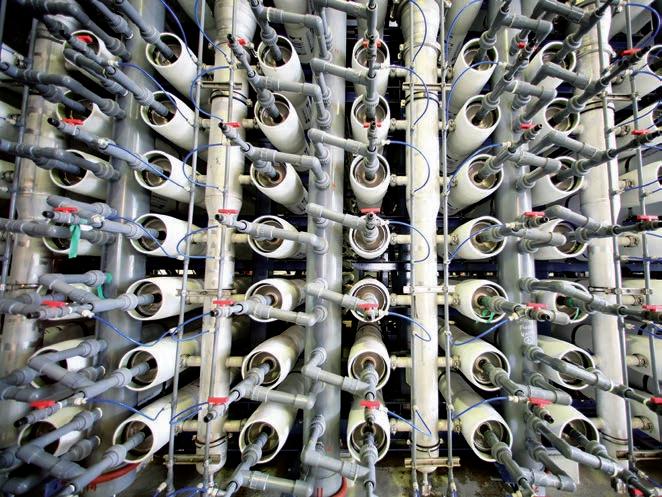
4 minute read
ROAD TO RECOGNITION
Recycled water helping to combat climate change
STRENGTHENING AUSTRALIA’S WATER SUPPLY IS A KEY STEP TOWARDS SUSTAINABILITY. VEOLIA IS HOPING ITS WASTEWATER RECYCLING AND RE-USE SERVICE WILL HELP REDUCE THE IMPACTS OF WHAT IT CALLS A “GLOBAL CLIMATE EMERGENCY”.
In 2020 alone, Veolia supplied 95 million people with clean drinking water.
The Intergovernmental Panel on Climate Change’s (IPCC) recently released assessment report highlights what it refers to as a “reality check”.
The report provides an in-depth detailing of previous, current and future trends of the global climate. It states the growing effects of climate change, as a result of climbing greenhouse gas emissions, will be felt across every inhabitable region, worldwide.
Water, waste, and energy management specialist Veolia is at the forefront of Australian and global efforts to reduce emissions as well as the world’s carbon footprint, developing sustainable methods to secure a steady water supply.
Fresh water represents just 2.5 per cent of the total available water across the globe. Factors such as global warming, rapid population growth and urbanization will significantly affect the worlds’ ability to maintain a reliable water supply, according to the report.
Daniel Spiller, Veolia Chief Operating Officer Water, says the time for action is now.
“Veolia believes that there is a global climate emergency. Our vision of ecological transformation is all about how we can contribute towards rectifying what could be considered generational damage to our environment,” Daniel says. He says this vision has led to increased innovation in relation to Australia’s national water supply.
“We don’t see anything as ‘wastewater’. Water is a resource, and it should be recycled and reused in order to become sustainable,” Daniel says.
“We are in a country where the effects of climate change can vary from location to location. There is a growing shortage of water in many sites across Australia, so expertise and technology have now become vital aspects of optimising a water supply.”
Veolia uses 350 internationally tested and proven technologies to service water refining, filtration and disinfection needs of its customers worldwide.
A filtration refining process extracts sediment, bacteria and micropollutants from water. Oxidation and decantation are also used to ensure that the end product maintains its quality for re-use.
Public support for implementing the changes is a major challenge, Daniel says, particularly surrounding the re-use and recycling of wastewater to create drinking water or additional water supply for agricultural or industrial organisations.
“This takes education and explanation so the public can be reassured that these technologies have been proven overseas for more than 50 years,” Daniel says.
“Perth is a great example. They have gone through a 10-year exercise, which has included a demonstration plant and discussions with key members within the community, before adding recycled supply to their drinking water supplies.”
Dr Arran Canning, Veolia’s Director of Strategy and Growth for Water, agrees introducing these technologies will only support Australia’s water infrastructure, especially for climateaffected regions.
“We are 100 per cent confident that we have the mentoring, servicing, and production in place to ensure that the outcome is safe and viable,” Arran says.
“Throughout the Veolia process there are treatments such as filtration systems, disinfection and chlorination. There’s a range of checks and balances. At any point if something doesn’t meet a specification production is halted.
“These can give people comfort that the water is not going directly into their taps before being thoroughly evaluated for quality and safety first. Every day we are treating a product to make sure it meets a standard which exceeds its requirements.”
In 2020, Veolia supplied 95 million people with drinking water and 62 million people were connected with its wastewater service.
Arran says concerns about the wastewater concept remain, but inevitable innovations for emission reduction in the industry will heavily influence how products such as water are treated in the future.
Veolia is using its recycled water service to provide a “climate independent” water supply.
“We can see that our major clients are setting zero carbon strategies as part of their business plans. We are well placed to support their requirements as we are across water, municipal waste and energy,” he says.
“With the rate of severe weather events increasing globally, Australia’s supply of water from conventional methods such as dams and aquifiers will not be sustainable in the long run. Having an alternative source of water for regional Australia will be, and currently is, essential.
“The technology is there for wastewater treatment; it is now just a matter of adopting it.
“As our climate changes in Australia and globally, these types of treatment will become more common.”
Veolia’s plan is to help clients select, manage and operate the source of water that best meets their needs. These supplies include alternatives which can be relied upon, even during severe weather events such as droughts.
Alternatives such as recycling provide users with a solution that is climate independent and usually cheaper and more environmentally sustainable than desalination, due to reductions in operating costs and energy consumption.
Daniel says climate change and the risks it presents require an efficient approach.
“I think we have learned over the past decade how important water is to the liveability of our communities,” he says.
“A lot of recycling now occurs in Australia, but there is more that we can do.
“Water recycling will reduce water stress nationally. It will also enable us to adapt to rapid growth which is occurring across many of our cities.”

For more information visit: www.veolia.com/anz










